本试题 “短文改错。此题要求改正所给短文中的错误,对标有题号的每一行作出判断:如无错误,在该行右边横线上画一个勾;如有错误(每行只有一个错误),则按下列情况改...” 主要考查您对人称代词
形容词的比较级
关系副词
副词
介词和介词短语
从属连词
动词的现在分词
动词
it的用法
等考点的理解。关于这些考点您可以点击下面的选项卡查看详细档案。
- 人称代词
- 形容词的比较级
- 关系副词
- 副词
- 介词和介词短语
- 从属连词
- 动词的现在分词
- 动词
- it的用法
人称代词的概念:
人称代词是替代我、你、他、她、它、我们、你们、他们、她们、它们等人称的词。
人称代词分为主格和宾格形式,并有人称的单复数形式。按所替代人称的不同分为第一人称、第二人称和第三人称。
人称代词的用法:
人称代词在句中可以用作主语(用主格,如:I,you,he,she,we,they,等)和宾语(用宾格,如 me,you,him,her,us,them等)
如:He loves her, but she hates him. 他爱她,但她却讨厌他。
注:(1)在口语中,当人称代词用作表语、用于than, as之后或用于强调句中被强调时,可以用语。 例如:
"Who is it?" "It's me."“是谁呀?”“是我。”
He sings better than me. 他比我唱得好。
He is as tall as her. 他和她一样高。
It's me who did it. 这是我干的。但是,若than,as后的人称代词后跟有动词,则必须用主格。例如:
He sings better than I do./ He is as tall as she is.
(2)单独使用的人称代词通常用宾格。
"I' m tired.""Me too."“我累了。”“我也累了。”
"Who wants this?" "Me."“谁要这个?”“我要。”
(3)有时用主格或宾格会导致意思的变化。
I like you better than he. 我比他更喜欢你。为 I like you better than he likes you. 之略。
I like you better than him. 我喜欢你胜过喜欢他。为 I like you better than he likes him. 之略。
人称代词主格、宾格、人称、单复数对比:
|
人称代词 |
单数 |
复数 | ||
|
主格 |
宾格 |
主格 |
宾格 | |
|
第一人称 |
I |
me |
we |
us |
|
第二人称 |
you |
you |
you |
you |
|
第三人称 |
he |
him |
they |
them |
|
she |
her |
them | ||
|
it |
it | |||
人称代词的排序:
人称代词的排列顺序为:单数人称代词通常按“二三一”排列,即you, he and I;复数人称代词通常按“一二三”排列,即we, you and they:
You, he and I are of the same age. 你,他和我都是同一年龄。
We, you and they are all good citizens. 我们,你们和他们都是好公民。
但若是用于承担责任或错误等场合,则可把第一人称I置于其他人称代词之前:
I and Tom are to blame. 我和汤姆该受批评。
比较:Tom and I hope to go there. 汤姆和我想去那儿。
注意:you and I 是固定结构,语序通常不宜颠倒。
人称代词知识体系:
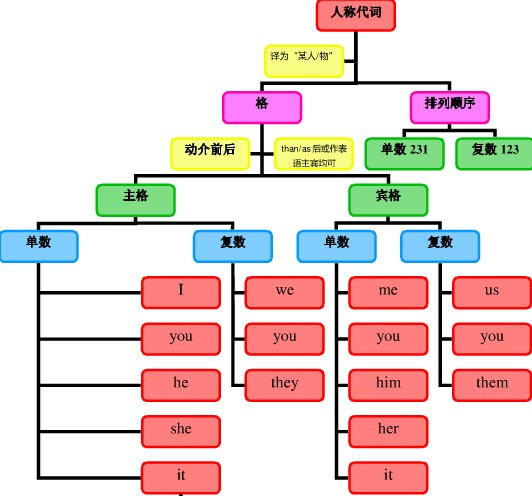
人称代词用法拓展:
1、在通常情况下,人称代词在句子中出现在它所代替的名词之后,即先出现名词,再出现相应的代词。但是,在书面语中,有时也可出现代词,后出现代词所代替的名词。
As soon as it had hopped off, the plane picked up speed.飞机刚一起飞,就加了速。
(比较:As soon as the plane had hopped off, it picked up speed.)
2、人称代词后跟名词同位语。有些人称代词后有时可跟同位语。
These small desks are forus students.这些小课桌是给我们学生的。
We girls often go to the movies together.我们女孩子常一起去看电影。
He asked you boys to be quiet.他要你们男孩子安静些。
形容词比较级概念:
大多数形容词(性质形容词)有比较级,用来表示两个人或事物之间的比较“较……”。
如:I am taller than you.
形容词比较级特殊用法:
1、没有比较对象的比较结构:
所谓没有比较对象的比较结构不是指省略而言,而是指并非真正的比较。
例如:The car runs faster than110 miles. 那辆车时速为110多英里。
There is more than one solution to the problem. 这个问题的解决办法不止一个。
The daily cost in an average hospital in the United States can run as high as $250. 在美国普通医院的每天的费用可高达250美元。
2、用比较级的形式表达最高级的意思:
在这种情况下,往往是将一个人或是一件事与其他所有的人或事相比较。注意别忘了常在比较状语中用any, other, else类的字眼,以将比较主体排除在比较对象以外,因为自己不可以与自己相比较。
例如:He is taller than any one else in our class. 他在我们班比其他任何都高。
Iron is more useful than any other metals. 铁比其他任何金属更有作用。
3、no+比较级+than的结构表示“A和B一样不……”:
例如:She runs no faster than her sister.她与她妹妹一样跑不快。
Tom is no wiser than John. 汤姆和约翰一样没有聪明才智。
He is no richer than his brother. 他与他弟弟一样不富有。
4、汉语可以说“昆明的气候比兰州好”。英语必须加that:
例如:The climate of Kunming is better than that of Lanzhou.
5、英语比较级常译作“较…”、“…一些”等,但不等于汉语的“更…”。汉语的“更…”须用“still”或“even”来表示:
如:This book is even more difficult than that one. 这本书比那本书更难。
6、有些情况下,汉语不用“较”等字眼,英语则须用比较级:
如:Will the younger people give their seats to old people? 请年轻人把座位让给老年人好不好?
形容词比较级的用法:
1、比较级用于二者的比较,其结构是:含有形容词比较级的主句+从属连词than引导的从句(从句中常省去意义上和主句相同的部分)。
如:Li is older than Zhou. 李比周年纪大。(从句中省去了is old)
There are more children in this nursey than in that one. 这个托儿所的孩子比那个托儿所多。(从句中省去了there are children)
After two years' physical training, she is healthier and stronger. 经过两年的体力锻炼,她(比以前)健康强壮多了。(注意这里省去了从句than she was)
We are much better off than ever before. 我们的生活比过去任何时候都要好得多。(than后省去了we were)
Paul weighs less than harry. 保尔的体重比哈利轻。
Mary is less clever than Jane. 玛丽不如简那么聪明。
2、可修饰比较级的词:
1)a bit, a little, rather, much, far, by far, many, a lot, lots, a great deal, any, still, even等
2)还可以用表示倍数的词或度量名词作修饰语。
3)以上词(除by far)外,必须置于比较级形容词或副词的前面。
典型例题:
1)—Are you feeling ____?
—Yes,I'm fine now.
A. any well
B. any better
C. quite good
D. quite better
答案:B. any可修饰比较级,quite修饰原级,well的比较级为better.
2)The experiment was____easier than we had expected.
A. more
B. muchmore
C. much
D. moremuch
答案:C. much可修饰比较级,因此B,C都说得通,但easier本身已是比较级,不需more,因此C为正确答案。
3)If there were no examinations, we should have___at school.
A. the happiest time
B. a more happier time
C. much happiest time
D. a much happier time
答案:D.
注:many, old和far用法:
1)如果后接名词时,much more+不可数名词 many more+可数名词复数
2)old有两种比较级和最高级形式:older/oldest和elder/eldest。elder,eldest只用于兄弟姐妹的长幼关系。
如:My elder brother is an engineer.
3)far有两种比较级,farther,further在英语中两者都可指距离。在美语中,father表示距离,further表示进一步。
如:I have nothing further to say.
3、比较级中的两个特殊作用的结构:
1)The+比较级+句子,表示的意义是“越(怎么样就)越(怎么样)”,在这个结构中的两个“比较级”不要求一定词性相同,它们各自的词性要依句子的需要而定;
2)和比较级+and+比较级。表示的意义是“越来越(怎么样)”,在这个结构中的两个“比较级”则要求词性相同。
例如:The harder you work at your study, the better academicrecords you will have. 你学习越努力,你的成绩就越好。
The more we have, the more we want. 人欲无穷。
When winter is coming, it gets colder and colder. 冬天来临之际,天越来越冷了。
He became less and less satisfied with the foot ball team's performance. 他对足球队的表现越来越不满意了。
形容词比较等级知识体系:
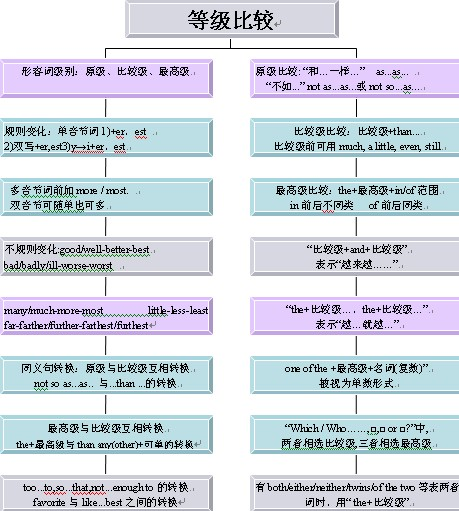
特殊形容词比较级变化:
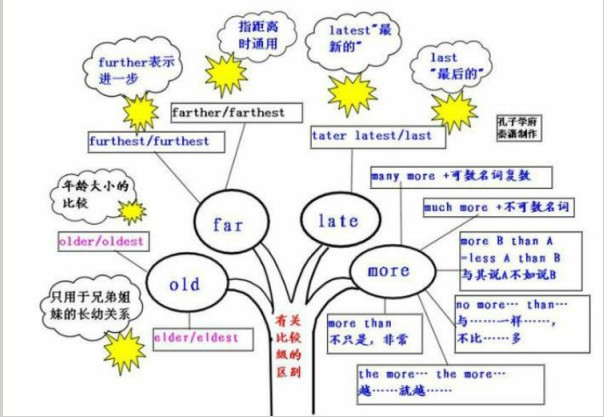
关系副词的概念:
关系副词兼有副词与连接词两种作用,在不及物动词的连接中要求用关系副词。关系副词有when, where, why。
关系副词的特点:
关于副词用于引出定语从句,主要有when, where, why:
如:Sunday is the day when very few people go to work. 星期日是没什么人上班的日子。
That's the reason why he dislikes me. 这就是他不喜欢我的原因。
Do you know a shop where I can find sandals? 你知道哪家商店我能找到凉鞋吗?
注:关系副词用于引出定语从句,且在从句中用作状语。关系副词when表示时间,where表示地点,why表示原因。
使用关系副词应注意的几点:
(1)how不能用作关系副词,不要想当然地将how用作关系副词置于theway后表示方式:他说话就是那个样子。
误:This is the way how he spoke.
正:This is how he spoke./ This is the way(that, in which)he spoke.
(2)关系副词when和where既可引导限制性定语从句,也可引导非限制性定语从句,但why只能引导限制性定语从句,不能引导非限制性定语从句(若引导非限制性定语从句,可用for which reason)。
(3)引导定语从句时,when的先行词为时间,where的先行词为地点,why的先行词为原因(主要是the reason),但是反过来却不一定:
如:Don't forget the time(that) I've toldyou.不要忘记我告诉你的时间。
Do you know the house(that) he bought recently? 你知道他最近买的那座房子吗?
Please tell me there as on(that) you know. 请告诉我你所知道的原因吧。
关系副词的用法:
关系副词有when, where, why,作用有三个:
1、连接主句与从句;
2、代替先行词;
3、在从句中作状语,不可省略。
When和where既可引导限制性定语从句,也可引导非限制性定语从句。Why只能引导限制性定语从句。这些关系副词在意义上都相当于一定得“介词+which”结构。
1)when=at/in/on/during,在定语从句中作时间状语。
例如:Tell me the time when(at which) the train leaves.
注意:
①当表示时间的先行词在从句中中作主语或宾语时,不能用when。
例如:I will never forget the days I spent with your family.
②It/This/That+be+the first/second/last time that…句型中,that是习惯用法,不能用 when代替,that还可以省略。从句中使用与“be动词”呼应的完成形式。
例如:It is the first time that I have been to the Great Wall.
2)where表地点,只能跟在表示地点的名词后,它在定语从句中作地点状语。
例如:This is the second school where I used to teach.
注意:
①引导词where可用that替换,并经常可以省略。
例如:That's the place(where/that) we went before.
②当表示地点的先行词在句中作主语或宾语时,不用where,用关系代词that或which。
例如:The factory that/which we visited yesterday was built last year.
③where可与from连用。
例如:His head soon appeared out of the second story windows, from where he could see nothing but rees.
3)why表原因,引导的从句修饰名词reason。Why可用that或forwhich替换或省略。
例如:I don't know the reason(why/for which/that) he left here.
副词的概念:
副词是指在句子中表示行为或状态特征的词,用来修饰动词、形容词、其他副词、介词短语、非谓语动词乃至整个句子,表示时间、地点、程度、方式等概念。
副词的位置:
1)在动词之前。
2)在be动词、助动词之后。
3)多个助动词时,副词一般放在第一个助动词后。
注意:
a. 大多数方式副词位于句尾,但宾语过长,副词可以提前,以使句子平衡。
如:We could see very clearly a strange light ahead of us.
b. 方式副词well,badly糟、坏,hard等只放在句尾。
如:He speaks English well.
副词的排列顺序:
1)时间,地点副词,小单位的在前,大单位在后。
2)方式副词,短的在前,长的在后,并用and或but等连词连接。
如:Please write slowly and carefully.
3)多个不同副词排列:程度+地点+方式+时间副词。
注意:副词very可以修饰形容词,但不能修饰动词。
改错:(错)I very like English.
(对)I like English very much.
注意:副词enough要放在形容词的后面,形容词enough放在名词前后都可。
如:I don't know him well enough.
There is enough food for everyone to eat.
There is food enough for everyone to eat.
兼有两种形式的副词:
1)close与closely:
close意思是“近”;closely意思是“仔细地”。
如: He is sitting close to me.
Watch him closely.
2)late与lately:
late意思是"晚";lately意思是“最近” 。
如:You have come too late.
What have you been doing lately?
3)deep与deeply:
deep意思是“深”,表示空间深度;deeply时常表示感情上的深度,“深深地” 。
如:He pushed the stick deep into the mud.
Even father was deeply moved by the film.
4)high与highly:
high表示空间高度;highly表示程度,相当于much。
如:The plane was flying high.
I think highly of your opinion.
5)wide与widely:
wide表示空间宽度;widely意思是“广泛地”,“在许多地方”。
如:He opened the door wide.
English is widely used in the world.
6)free与freely:
free的意思是“免费”;freely的意思是“无限制地”。
如:You can eat free in my restaurant whenever you like.
You may speak freely, say what you like.
副词知识体系:
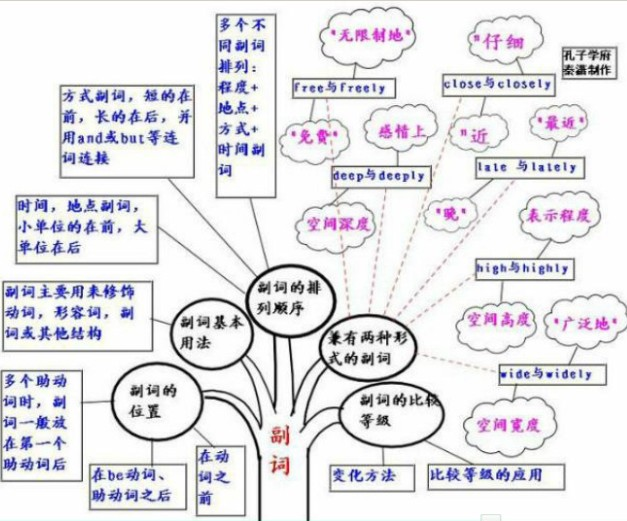
介词和介词短语的概念:
介词是一种用来表示词与词、词与句之间的关系的虚词,在句中不能单独作句子成分。介词后面一般有名词、代词或相当于名词的其他词类,短语或从句作它的宾语。介词和它的宾语构成介词词组,在句中作状语,表语,补语或介词宾语。介词可以分为时间介词、地点介词、方式介词和其他介词。
误用介词的三种情况:
1、多用介词:
多用介词可能是受汉语意思的影响将及物动词误用作不及物动词,也可能是受相关结构的影响而用错:
误:We discussed about the plan.
正:We discussed the plan. 我们讨论了计划。
误:Did he mention about the accident?
正:Did he mention the accident? 他提到那次事故了吗?
误:I saw her enter into the bank.
正:I saw her enter the bank. 我看见她进了银行。
误:He married with[to] a nurse.
正:He married a nurse. 他同一位护士结了婚。
误:How can contact with you?
正:How can contact you? 我怎么与你联系?
误:We should serve for the people heart and soul.
正:We should serve the people heart and soul. 我们应该全心全意地为人民服务。
误:Who controls over the factory? (但名词control可接over)
正:Who controls the factory? 谁管理这个工厂?
误:He has a great many of friends here. (比较a great number of)
正:He has a great many friends here. 他在这儿有很多朋友。
2、漏用介词:
漏用介词可能是受汉语意思的影响将不及物动词误用作及物动词,或是受相关结构的影响的影响而用错等:
误:This matter is difficult to deal. (deal with=处理)
正:This matter is difficult to deal with. 这事很难处理。
误:He is not a man to be depended.
正:He is not a man to be depended on. 他不是个可靠的人。
误:He took a cup of tea, and went on the story.
正:He took a cup of tea, and wentonwiththestory.他喝了一口茶,又接着讲故事。
误:My mother still regards me a child. (比较consider…as中的as可省略)
正:My mother still regards me as a child. 我母亲还把我当小孩看。
误:They insisted sending a car over to fetch us.
正:They insisted on sending a car over to fetch us.他们坚持要派车来接我们。
误:What he says is worth listening.
正:What he said is worth listening to.他的话值得一听。
3、错用介词:
错用介词的情况比较复杂,可能是因受汉语意思的而错,也可能是因弄不清搭配关系而错,可能是混淆用法而错,也可能是受相关结构的影响而错,可能是忽略语境而错,也可能是想当然的用错:
误:She called on his office yesterday. (call on+人,call at+地点)
正:She called at his office yesterday. 她昨天去了他办公室拜访。
误:He is engaged with a nurse.
正:He is engaged to a nurse.他与一位护士订了婚。
误:The sun rises from the east.
正:The sun rises in the east.太阳从东方升起。
误:Under his help, I finished it in time.
正:With his help, I finished it in time. 在他的帮助下,我及时做完了。
误:During he was in Japan, he visited many places.
正:During his stay in Japan, he visited many places.他在日本期间,参观过许多地方。
误:We are familiar to his character.
正:We are familiar with his character.我们了解他的性格。
误:Help yourself with the fruit.
正:Help yourself to the fruit.吃点水果吧。
介词的宾语:
1、名词或代词作介词宾语:
如:Are you interested in history? 你对历史感兴趣吗?
Don't worry about it. 别为它担心。
注:若是人称代词用作介词宾语,要注意用宾格。
如:No one can sing like her. 没有人能像她那样唱歌。(不能用like she)
2、动名词作介词宾语:
如:He is good at telling stories. 他善于讲故事。
In crossing the street he was run over. 他在穿过马路时被汽车撞倒。
3、过去分词作介词宾语:
如:We can't regard the matter as settled. 我们不能认为这事已经解决。
I take it for granted you have read the book. 我以为你读过这本书。
注:过去分词用作介词宾语通常只见于某些固定结构中,如上面第1句涉及regard…as(认为…是)结构,第2句涉及take sth for granted(认为某事属实)。在其他情况下,介词后通常不直接跟过去分词作宾语,若语义上需要接过去分词(表被动),可换用“being+过去分词”:
如:He went out without being seen by the others.他出去了,没有被其他人看见。
4、从句作介词宾语:
如:He was not satisfied with what she said. 他对她说的不满意。
I'm worried about where he is. 我担心他上哪儿去了。
注:介词后通常不接that从句,遇此情况需考虑用其他结构:
误:He paid no attention to that she was poor.
正:He paid no attention to the fact that she was poor. 他根本不注意她很穷这一事实。
但有个别介词(如except)可接that从句。
比较:I know nothing about him except that he lives next door./I know nothing about him except for the fact that he lives next door. 我只知道他住在隔壁,其它的就不知道了。
5、不定式作介词宾语:
如:I had no choice but to wait. 除了等,我没有别的选择。
He wanted nothing but to stay there. 他只想留在那儿。
They did nothing but complain. 他们老是一个劲地抱怨。
He never did anything but watch TV. 除了看电视,他从不干任何事。
注:(1)介词后接不定式的情形通常只见于but, except等极个别个词。该不定式有时带to,有时不带to,其区别是:若其前出现了动词do,其后的不定式通常不带to;
若其前没有出现动词do,则其后的不定式通常带to。
(2)介词后虽然通常不直接跟不定式作宾语,但却可接“连接代词(副词)+不定式”结构:
如:He gave me some advice on how to do it. 对于如何做这事他给我提了些建议。
6、形容词作介词宾语:
如:Her pronunciation is far from perfect. 她的语音远不是完美的。
In short, we must be prepared. 总而言之,我们要有准备。
Things have gone from bad to worse. 事情越来越糟。
注:(1)有些形容词用作介词宾语可视为其前省略了动名词being:
如:He regarded the situationas(being) serious. 他认为形势严重。
His work is far from(being) satisfactory. 他的工作丝毫不令人满意。
(2)有些“介词+形容词”的结构已构成固定搭配:in full全部地,全面地,无省略地; in private私下地,秘密地; in particular特别地;in general一般地,通常地,概括地; in brief 简言之;in short总之,简言之; in vain徒然地,徒劳无益地;for fee免费地,无偿地; for certain肯定地,确切地;for sure肯定地,确切地; for short为了简短,简称;atl arge自由自在地,逍遥法外; by far…得多
7、副词作介词宾语:
如:I can't stay for long. 我不能久呆。
It's too hot in here. 这里面太热了。
I looked every where except there. 除了那儿,我到处都看过了。
8、数词作介词宾语:
如:The city has a population of four million. 这座城市有四百万人口。
He was among the first to arrive. 他是第一批到的。
9、介词短语作介词宾语:
如:Choose a book from among these. 从这些书中选一本吧。
I saw her from across the street. 我从街的对面望见了她。
注:通常可后接介词短语作宾语的介词是from, till, until, since, except, instead of等。
比较:I took it from the bed. 我从床那儿(或床上)拿的。
I took it from under the bed. 我从床下拿的。
10、复合结构用作介词宾语:
如:She had no objection to Mary marrying him. 她不反对玛丽与他结婚。
She came in with a book in her hand. 她手里拿着一本书走了进来。
All the afternoon he worked with the door locked. 整个下午他都锁着门在房里工作。
介词短语的句法功能:
1、表语:
如:He was with a friend. 他和一个朋友在一起。
Health is above wealth. 健康胜过财富。
This knife is for cutting bread. 这把小刀是用于切面包的。
注:有些介词(如because of)引出的短语通常只用作状语,不用作表语:
误:His absence is because of the rain.
正:His absence is due to the rain. 他因雨未来。
但是,若主语是代词(不是名词),becauseof引出的短语可用作表语:
如:It is because of hard work. 那是因为辛苦工作的原因。
2、状语:
如:Don't touch it with your hands. 别用手去摸它。
Did you do this by design or by accident? 你这样做是有意的还是无意的?
3、定语:
如:This is his reply to your letter. 这是他给你的回信。
This is the best way of doing it. 这是做此事最好的方法。
My love for you is deeper than the sea. 我对你的爱比海深。
4、宾语补足语:
如:I found everythingin good condition. 我发现一切正常。
Her illness kept her in bed for a week. 她因生病在床上躺了一星期。
注:用作宾语补足语的介词短语在相应的被动语态中则为主语补足语:
如:He was regarded as a hero. 他被看成是英雄。
5、宾语:
如:A man stepped out from behind the wall. 一个人从墙后走出来。
He cannot spare anytime except on Sunday. 除星期日外,他抽不出时间。
6、主语:
如:Between6 and 7 suits me. 六点到七点对我比较适合。
After the exams is the time to relax. 考试后是轻松一下的时间。
注:介词短语通常不用作主语,尽管有时也像上面这样用作主语,但通常可视为是在一定的上下文中有所省略:
如:—When are we going to have the next meeting? 我们下次什么时候见面?
—On Tuesday may be convenient. 星期二可能比较方便。
此句中onTuesday虽用作主语,但可视为是其前省略了meeting一词:
即:Meeting during the vacation may be convenient.
从属连词的概念:
连词用于引导从句以形成句子的一部分或修饰句子的构成要素的叫作从属连词。
英语从属连词用法分类详解:
1、引导时间状语从句的从属连词:
(1)表示“当…时候”或“每当”的时间连词。主要的when, while, as, whenever:
如:He jumped up when the phone rang. 电话铃响时他吓了一跳。
We listened while the teacher read. 老师朗读时我们听着。
The phone rang just as I was leaving. 我正要离开,电话铃就响了起来。
(2)表示“在…之前(或之后)”的时间连词。主要的有before, after:
如:Turn the lights off before you leave. 离开前请关灯。
He started the job soon after he left the university. 他大学毕业后就开始做这份工作。
(3)表示“自从”或“直到”的时间连词。主要的有since, until, till:
如:He has lived here since he got married. 他结婚后就一直住在这儿。
Most men worked until[till] they're 65. 大多数男人工作到65岁。
(4)表示“一…就”的时间连词。主要的有as soon as, the moment, the minute, the second, the instant, immediately, directly, instantly, once, no sooner…than, hardly…when等:
如:Tell him the news as soon as you see him. 你一见到他就把这消息告诉他。
I recognized her the moment(that) I saw her. 我一看到她就认出她来了。
I want to see him the minute(that) he arrives. 他一到来我就要见他。
I went home directly I had finished work. 我一干完活就回家了。
Once he arrives, we can start. 他一来我们就可以开始。
(5)表示“上次”、“下次”、“每次”等的时间连词。主要的有every time(每次),each time(每次),(the) next time(下次),any time(随时),(the) last time(上次),the first time(第一次):
如:Last time I saw him, he looked ill. 上次我见到他的时候,他好像有病。
Next time you're in London come and visit us. 你下次来伦敦过来探望我们。
Do look me up next time you're in London. 你下次到伦敦来,一定来找我。
Every time I call on him, he is out. 我每次去访问他,他都不在。
You can call me any time you want to. 你随时都可以给我打电话。
【注】every time,each time,any time前不用冠词,(the)next time, (the)last time中的冠词可以省略,而the first time中的冠词通常不能省略。
2、引导条件状语从句的从属连词:
这类连词主要有if, unless, as[so] long as, incase等:
如:If anyone calls tell them I'm not at home. 要是有人打电话来,就说我不在家。
You will fail unless you work hard. 你若不努力就会失败。
As[So] long as you need me, I'll stay. 只要你需要我,我就留下。
In case I forget, please remind me about it. 万一我忘记,请提醒我一下。
【注】在条件状语从句中,通常要用一般现在时表示将来意义,而不能直接使用将来时态。不过,有时表示条件的if之后可能用will,但那不是将来时态,而是表示意愿或委婉的请求(will为情态动词):
如:If you will wait a moment, I'll fetch the money. 请等一下,我就去拿钱。
3、引导目的状语从句的从属连词:
主要有in order that, so that, in case, for fear等:
如:We used the computer in order that we might save time. 我们使用计算机是为了节约时间。
Speak clearly so that they may understand you. 说清楚,以便让他们能明白你的意思。
Be quiet in case you should wake the baby. 安静些,免得把婴儿吵醒。
He is working hard for fear he should fail. 他努力工作以免会失败。
4、引导结果状语从句的从属连词:
主要的有so that, so…that, such…that等:
如:We're all here now, so that the meeting can begin at last. 我们现在都到齐了,终于能开会了。
It's so difficult a question that none of us can answer it. 那是一个很难的问题,我们没有一个人能回答。
He shut the window with such force that the glass broke. 他关窗户用力很大,结果玻璃震破了。
【注】so that中的that在口语中通常可以省略。
5、引导原因状语从句的从属连词:
主要的有because, as, since, seeing(that), now(that), considering(that)等:
如:He couldn't got to school because he had a cold. 他因患感冒而未能去上学。
Since everybody is here, let's begin our discussion. 大家都到了,我们就开始吧。
Seeing that it is 8o'clock, we'll wait no longer. 由于时间已到8点,我们将不再等了。
Now that you are here, you'd better stay. 你既然来了,最好还是留下吧。
6、引导让步状语从句的从属连词:
主要有although, though, eventhough, even if, while, however, whatever, whoever, whenever, wherever等:
如:Although[Though] he is poor, he is well contented. 他虽穷却能知足常乐。
Though[Even though] it's hard work, I enjoy it. 尽管是苦活,但我乐意干。
Even if you don't like wine, try a glass of this. 即使你不喜欢喝酒,也尝尝这杯吧。
7、引导方式状语从句的从属连词:
主要有as, like, as if, as though, the way等:
如:Do it as[like] he does. 像他那样做。
He behaved as if nothing had happened. 他装作若无其事的样子。
They treat me as though I were a stranger. 他们待我如陌生人。
Nobody else loves you the way(=as) I do.没有人像我这样爱你。
8、引导地点状语从句的从属连词:
主要有where, wherever, everywhere等:
如:There were lots of parks where I lived. 我住的地方有许多公园。
Sit wherever you like. 你想坐在那儿就坐在那儿。
Everywhere they went, they were warmly welcomed. 他们每到一个地方都受到热烈欢迎。
9、引导比较状语从句的从属连词:
主要有than和as…as:
如:It's easier than I thought. 这比我想像的要容易。
They are as often wrong as they are right. 他们错对各半。
10、引导名词性从句的从属连词:
主要有that, if, whether:
如:It is clear enough what he meant. 他是什么意思很清楚。
Your greatest fault is that you are careless. 你最大的缺点是粗心大意。
Whether it will do us harm remains to be seen.是否对我们有害还要看一看。
She didn't say if he was still alive. 她没说他是否还活着。
从属连词知识体系:
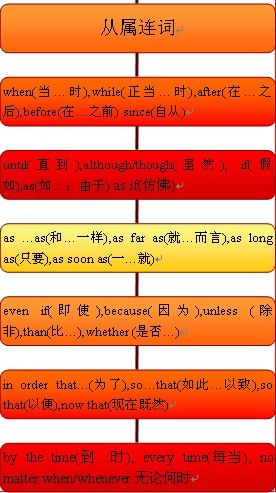
用作从属连词的六类名词结构:
英语中有些名词结构可用作从属连词,用以引导状语从句,且主要是时间状语从句。这类结构归纳起来有以下六类:
一、the+瞬间名词:
其中的瞬间名词主要包括moment, minute, instant, second等,其意为“一……就……”,相当于as soon as。
如:The minute he saw her he fell in love. 他对她一见倾心。
Telephone me the moment(that) you get the results. 你一有结果,马上给我打电话。
I was so tired that I fell asleep the instant I closed my eyes. 我很累,一合上眼就睡着了。
Sheputdownthereceiverthesecondsherecognizedmyvoice.她一听出是我的声音,马上就放下电话听筒。
注:其中的瞬间名词后可接that,也可省略。另外,有的个别副词(如directly/immediately等)也可表示类似意思。
如: Immediately the meal was over,he switchedon the radio.饭一吃完他就把收音机打开。
二、the+季节名词:
其中的季节名词包括spring,summer,autumn,winter,其意为“在……的那年春天、夏天、秋天、冬天。
如:His wife left him thes pring he went abroad.在他出国的那年春天,他的妻子离开了他。
He sold his house and went to the souththe summer he lost hisjob.在他失业的那年夏天,他卖掉房子去了南方。
He was sentto prison the winter his third daughter was born.在他第三个女儿出生的那年冬天,他被关进了监狱。
She got married the autumn she graduated from college.她大学毕业的那年秋天就结婚了。
三、the+时间名词:
其中的时间名词主要包括hour,day,night,week,month,season,year等,其意为“在……的时候、那天、那个晚上、那周、那个月、那个季节、那年”。
如: The hour he wa sin her office,he felt very sad.当他在她办公室的时候,他感到很伤心。
The day here turned home,his father was already dead.他回家的那一天,他的父亲已经死了。
The night I wenttoseeher,shehadleftforBeijingtoattendanimportantmeeting.就我去看她的那个晚上,她到北京去开一个重要的会议了。
Mr Smith didn't go to work the week his wife was ill.史密斯先生在他妻子生病的那个星期没去上班。
They ear helivedinthecountry,he learned alot.他在乡下呆的那一年,他学到了不少东西。
四、the+序数词+time
其中的序数词包括first,second,third,fourth等,其意为“当第几次……的时候”。
如: My girlfriend beat me at pokert he first time weplayed.我头一次和女朋友打扑克,她就把我赢了。
These cond time I saw her,she looked like an old woman.我第二次见到她时,她看上去像一个老太婆。
The third time I went there,I found all of them had left and the offices were all empty.我第三次去那儿时,我发现他们都离开了,所有的办公室都是空的。
注:
1.next,last也具有类似序数词的性质,因此也具有以上用法。
如: Nexttimeyoucomein,pleaseclosethedoor.下次你进来,请关门。
Thelasttimewetalkedhesaidheneededanothertwodays.上次我们谈话时他说他还需要两天。
2.thefirsttime,thesecondtime,thethirdtime等用作连词引导时间状语从句时,其前通常要有定冠词,而(the)nexttime,(the)lasttime引导状语从句时,其中的冠词可以省略,如下面这道上海高考题,其答案是C,不是A:
I though ther nice and honest______Imether.
A.first time B.fo rthe first time C.the first timeD.by the first time
五、不定代词+time
其中的不定代词主要包括each,every,any等。
如:Every time I ringher,the phone is engaged.我每次给她打电话,电话都占线。
Every time I see him he either wants to tell me his trouble or borrow some money.每次我见到他,他不是向我诉苦,就是要向我借钱。
He felt nervous each times he spoke to him.每次她和他讲话,他都感到紧张。
AnytimeyoucometoLondondolookmeup.你无论什么时候到伦敦来,一定要来看我。
注意:everytime,eachtime,anytime用作连词引导状语从句时其前习惯上不用冠词,它与the first time,these cond time,the third time等引导时间状语从句时其前必须要用定冠词不同。
六、其他名词结构
以上归纳的名词结构均用于引导时间状语从句,有些其他结构还可引导其他性质的状语从句,如the way可用于引导方式状语从句,表示“像……一样”。如:
The didn’t do it the way we do now.那时他们不像我们现在这样行事。
Joyce looked at me the way alotof girls did.乔伊丝像许多姑娘那样瞧着我。
注:这样用的theway与as用法相似。
如:Hold itin both hands,the way(=as)Mummy does.用两只手捧住,像妈妈那样。
现在分词的概念:
现在分词是由动词原形加词尾-ing构成。现在分词有主动意义,同样也有时态和语态的变化。
动词现在分词变化规则:
1、一般情况下在动词后加ing,如:study—studying,work—working
2、以不发音的字母e结尾的动词,先去掉e再加ing,如:write—writing,move—moving
3、以一个元音字母和一个辅音字母结尾的重读音节结尾的动词,要双写末尾一个辅音字母,再加ing,如:get—getting,begin—beginning
4、以ie结尾的动词,一般将ie改为y,再加ing,如:lie—lying,die—dying,tie—tying
注意:以l结尾的动词,尾音节重读时,双写l,如:control—controlled,尾音节不重读时,双不双写都可以,如:travel—traveling/travelling。特例:picnic—picnicking。
动词现在分词用法拓展:
1、现在分词的构成:
现在分词是由动词原形加词尾-ing构成。现在分词同样有时态和语态的变化,通常有下表几种形式(以do为例):
一般式:主动形式doing
被动形式beingdone
完成式:主动形式havingdone
被动形式having been done
现在分词的否定形式是由not加现在分词构成。
如:Not knowing his address, I could do nothing but stay at home and wait. 不知道他的地址,我只好在家里等着。
His not coming made all of us angry. 他没来使我们大家都很生气。
2、现在分词的一般式和完成式:
现在分词的一般式表示和谓语动词所表示的动作同时进行的动作;完成式表示在谓语动词所表示的动作之前发生的动作。
如:Being a student, he was interested in books. 作为一个学生,他对书本很感兴趣。
Not having studied his lessons very hard, he failed the examinations. 因为没有努力学习功课,他考试不及格。
3、现在分词的被动式:
现在分词的被动式表示它的逻辑主语是现在分词动作的承受者。根据现在分词动作发生的时间,现在分词的被动式有一般被动式(being done)和完成被动式(having been done)。
如:The question being discussed is very important. 正在被讨论的问题很重要。
Having been criticized by the teacher, he gave up smoking. 被老师批评以后,他把烟戒了。
注意:在need, want, require, beworth等动词(短语)后,作宾语的现在分词常用主动形式来表示被动含义。
如:Your shoes need cleaning.=Your shoes need to be cleaned. 你的鞋需要清洗一下了。
This book is well worth reading. 这本书很值得一看。
动词的定义:
表示动作中状态的词叫做动词。根据其在句中的功能,动词可分为行为动词、系动词、助动词和情态动词四类,有些动词是兼类词。
例如:We have lunch at 12. (have是行为动词)
We have been to NewYork. (have是助动词)
I am hungry. (am是系动词)
You need not have waited for me. (need是情态动词)
The door needs painting. (need是兼类词)
动词的分类:
1)表示动作中状态的词叫做动词。
2)根据其在句中的功能,动词可分为四类,分别是:
实义动词(Notional Verb)、系动词(Link Verb)、助动词(Auxiliary Verb)、情态动词(Modal Verb)。
说明:有些情况下,有些动词是兼类词。
例如:We are having a meeting. 我们正在开会。(having是实义动词。)
He has gone to NewYork.他已去纽约。(has是助动词。)
3)动词根据其后是否带有宾语,可分为两类,分别是:
及物动词(Transitive Verb)、不及物动词(Intransitive Verb),缩写形式分别为vt.和vi.。
说明:同一动词有时可用作及物动词,有时可用作不及物动词。
例如:She can dance and sing. 她能唱歌又能跳舞。(sing在此用作不及物动词。)
She can sing many English songs. 她能唱好多首英文歌曲。(sing用作及物动词。)
4)根据是否受主语的人称和数的限制,可分两类,分别是:
限定动词(Finite Verb)、非限定动词(Non-finite Verb)。
例如:She sings very well. 她唱得很好。(sing受主语she的限制,故用第三人称单数形式sings。)
She wants to learn English well. 她想学好英语。(to learn不受主语she的限制,没有词形变化,是非限定动词。
说明:英语中共有三种非限定动词,分别是:动词不定式(Infinitive)、动名词(Gerund)、分词(Participle)。
5)根据动词的组成形式,可分为三类,分别是:
单字词(One-Word Verb)、短语动词(Phrasal Verb)、动词短语(Verbal Phrase)
例如:The English language contains many phrasal verbs and verbal phrases. 英语里有许多短语动词和动词短语。(contains是单字动词。)
Students should learn to look up new words in dictionaries. 学生们学会查字典。(look up是短语动词。)
The young ought to take care of the old. 年轻人应照料老人。(takecareof是动词短语。)
6)动词有五种形态,分别是:
原形(OriginalForm)、第三人称单数形式(Singular From in Third Personal)、过去式(Past Form)、过去分词(Past Participle)、现在分词(Present Participle)。
动词知识体系:
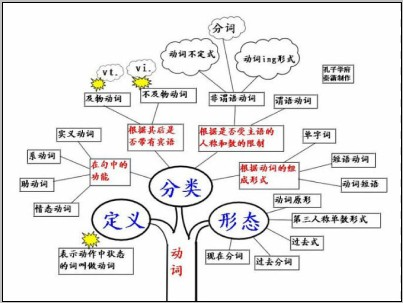
it的概念:
it可用作人称代词、指示代词、先行词及引导词等。
it 的用法:
1、it可指天气、温度、时间、距离等 。
如:It is cold today, isn't it?
2、用作人称代词,代替前文提到过的事物。
如:The dog is not acold-blooded animals. It doesn't need to hibernate.
3、为避免重复,it可用来代替前面说过的短语或句子。
如:I tried to persuade my father to give up smoking, but found it impossible. (it=to persuade my father to give up smoking)
4、代替指示代词this,that。
如:—What's this?
—It's an album.
—Whose new bike is that?
—It's Mary's.
注:it与one,that的区别:
it=the(this, that)+名词,特指并且代替前面所提到的某特定事物。
如:He's bought a new car, so he drives it everywhere to show ito ff.
one=a+名词,one指前面提到的同类事物中的不同的另一个。
如:He needs a computer, but he can't afford one.
that=the+名词,that指代的名词与前面的名词属于同一类,但不属同一个。
如:The population of China is larger than that of Japan. that指代population,但其后有一个of短语作定语,以区别于the population of China。
注:it与that的异同:
it指同一事物,that指同类但并不是同一事物。
如:I like the climate of Kunming more than that of Beijing.
The climate of Kunming is mild, and I like it.
5、It/This/That+be+the first(second, third...) time+that-clause 这个句型表示截止到说话时为止的某人的一种经历,关键是注意time前有序数词,主句是一般现在时is时,从句要用现在完成时;如果主句用一般过去时was时,则从句须相应地用过去完成时。
如:This is the first time(that) these Europeans have visited the Great Wall.
It was the fifth time(that) I had paid a friendly visit to America.
6、在一些相对固定的词组中,没有特殊含义,经常不翻译。
如:He's never really made it as an actor. 作为演员,他从未获得过真正的成功。
It is my turn. 轮到我了。
强调句中的it:
可以用来改变句子结构,使句子的某一成分得到强调:
1)强调句的基本句型it's/was+被强调成分+that/who+其他成分
原句:I told Jim the news in our office yesterday.
强调主语:It was I that/who told Jim the news in our office yesterday.
强调宾语:It was Jim that I told the news in our office yesterday.
或:It was the news that I told Jim in our office yesterday.
强调地点状语:It was in our office that I told Jim the news yesterday.
强调时间状语:It was yesterday that I told Jim the news in our office.
2)强调句的一般疑问句型Is/Was+it+所强调部分+that/who...?
如:Was it you that told Jim the news in your office yesterday?
3)强调句的特殊疑问句型疑问词+is/was+it+that/who...?
如:Who was it that told Jim the news in your office yesterday?
【注】强调句与主语从句虽然在形式上很相似,即都含有it is(was)...that。但,区别在于:强调句去掉it is(was)…that之后,句子结构仍然完整,而主语从句却不能这样。
如:(It is)our hope(that) the two sides will work towards peace.
解析:去掉It is…that之后,句子是不成立的。由此得出该句不是强调句,而是一个简单的主语从句,it是形式主语,从句是真正的主语。
“it”的用法:
1、it 作形式主语:
it 在句中可作形式主语,而真正作主语的主语从句需要放在句子的末尾。主语从句后置常用以下几种结构:
1)It is/was+adj.+subject-clause可用于此句型的形容词有:
clear, certain, funny, good, impossible, likely, natural, obvious, possible, probable, strange, surprising, true, unusual, wonderful等。
如:It is obvious that going for sports will do a lot of good to your health.
2)It+be+adj./n.(forsb./ofsb.)+todosth. 该句型中的形容词通常表示事物的特点或特征的,如:
difficult, hard, easy, impossible, necessary, important等,此时用for;或表示人的性格特征或特点的,如:
nice, good, bad, kind, silly, foolish, wise, clever, careless, rude, brave, cruel, careful, grateful等,这时要用of 。
3)It is/was+名词词组+subject-clause可用于该结构的名词词组有:
a pity/duty, a good thing, no surprise, good news, an honor, a fact, a mystery, a shame, manners等。
如:It's a pity that I didn't attend the party.
4)It is/was+V-ed+subject-clause可用于该结构的动词的过去分词有:
said, reported, thought, supposed, believed, hoped, expected, known, decided, announced, arranged等。
如:It is said that something had been done to end the pollution.
注:本句还可改写为:Something is said to have been done to end the pollution.
5)It+vi.+subject-clause可用于该结构的动词有:appear, seem, happen, occur等。
如:It appeared to scientists that the stars had moved.
6)It doesn't matter(makes no difference,etc.) +连接代词或连接副词引起的从句作宾语。
如:It doesn't matter whether he'll join the army or not.
It makes no difference where we have the conference.
7)一些固定句型:
It takes sb. some time to do sth.
如:It will take you two days to get there on foot.
It costs sb. some money to do sth.
如:It costs 1,000 dollars to fly to America.
It is/was no use(useless) doing(做什么是没有用处的)
如:It's no use arguing with him.
It is/was no good doing(做什么是没有好处的)
8)以下句型结构中需要用虚拟语气
① It is/was important(necessary, strange) that...;
It is/was ordered(required, suggested, proposed) that...;
It is/was a pity(a shame) that...表示遗憾等感情的句子中,主语从句要用“should+动词原形”,should可以省略。
如:It's necessary that he(should) be operated on at once.
② It is (high)time that...结构中用should+动词原形(should不能省略)或动词过去式。
如:It is high time that you should make(made) full use of your time to go over your lessons.
2、it作形式宾语:
1)动词consider(feel, find, think等)+it+形容词(名词)+不定式(动词-ing形式,从句)。
如:She thinks it no use telling me.
2)主语+appreciate(enjoy,like,love,hate)+it+if(when)...结构
如:We would appreciate it if you could come to help us.
3)dependon, relyon, see to(负责/设法做到), takeforgranted(习以为常)等短语后跟that从句时,要以it作形式宾语。
如:We're depending on it that he will finish the job by Friday.
“it ”引起的几个易混淆的时间句型:
1)It be+时间+since-clause 这个句型表示从since从句谓语动作发生以后到现在或过去所经过的一段时间,意为“自从…以来已多久了”,主句多用一般现在时,从句用一般过去时,如果表示过去的情况,主句一般用过去时,从句用过去完成时,或主句用过去完成时,从句用一般过去时。
注:since引导时间状语从句时,从句若使用终止性动词,则表示该时间是主句时间段的终点(时间从现在算起);若从句使用延续性动词,则表示该动作状态的结束(时间从过去算起)。
如:It's five years since they got married. 他们结婚已经5年了。
It's five years since they were married. 他们离婚已经5年了。
It's ten years since his father was a worker. 他父亲不当工人已经10年了。
I haven't seen him since we were boys together. 我们长大以后再没有见过面。
2)It be+时间+before-clause 这个句型中的时间一般为表示一段时间的词语(如:long years, months, weeks, days, hours, minutes),主句中的谓语动词用肯定式,意为“过多长时间才…”。主句的谓语动词是否定式时,意为“没过多长时间就…”。主句的时态可用过去时was或将来时willbe;用was时,before从句的动词用一般过去时;用willbe时,before从句常用一般现在时。 如:It was not long before she learned those poems by heart. 她没过多久就背会了那些诗。
It was long before the police arrived. 过了很久警察才来。
It will be hours before he makes a decision. 要过好几个小时他才会作出决定。
It will not be hours before we meet again. 要不了几个小时我们还会再见面的
3)It be+时间+when-clause 这个句型中,it指时间,而且表示时间的词语前没有介词(时间一般是具体时间)。主句和从句中的谓语动词在时态上是一致的,主句是willbe,when从句用一般现在时代替将来时。
如:It was already 8 o'clock when we got home.
It will be late afternoon when they get there.
4)It be+时间+that-clause 这个句型是个强调句型。
如:It was at 5o'clock that he practiced playing the violin in the morning. (原句是:He practiced playing the violin at 5o'clock in the morning.)
比较:It was 5o'clock when he started in the morning.(5o'clock前没有介词,这个是定语从句)
5)It be+time+that-clause 这个句型属虚拟语气结构,不管主句中用的是is或was,that从句都须用动词的过去式或should+动词原形(但不及物动词通常用过去式),在time之前有时可以加上high 或about 以加强语气。
如:It is high time(that) he wrote a letter to his girl friend.
It is time(that) we made people's life a little easier.= It is time that we should make people's life a little easier.
与“短文改错。此题要求改正所给短文中的错误,对标有题号的每一...”考查相似的试题有:
- After the new technique was introduced the factory produced ______cars in 1994 as the year before.A.as twice manyB....
- ------Did you see the movie last night?------Yes, but it was __________ disappointing.A.a sort ofB.sort ofC.type o...
- 短文改错。此题要求改正所给短文中的错误。对标有题号的每一行作出判断:如有错误(每行只有一个错误),则按下列情况改正:...
- The woman sold the eggs ________ seven dollars and they were sold________half price.A.with;atB.for;atC.at;inD....
- When she was in trouble, I did what I could to help her.__________ my help, she wrote me a letter of thanks.A.In h...
- Those who are not active or______ diet is high in fat will put on weight quickly.A.whatB.thatC.whichD.whose
- 26. Parents always tell us not to stay ________ there is danger.A.in whichB.the place whereC.at the placeD.Where
- Can you ______ the difference ______ the two phrases?A.tell, betweenB.speak, fromC.say, ofD.talk, between
- 短文改错 。如下短文共有10处错误,每句中错误最多有两处。错误涉及一个单词的增加、删除或修改。按以下要求进行修改:1)增...
- Although money is important, not many people ______ the idea that money can bring happiness and health.A.appeal toB...